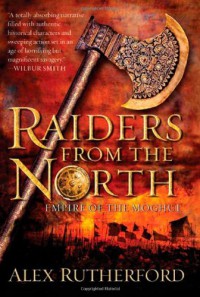
Raiders from the North is the story of the life of Babur, the creator of the Moghul empire. At various times Babur was the ruler of Samarkand, Ferghana (in modern day Uzbekistan), and Kabul. But his lasting impact was the creation of the Moghul empire in Delhi of modern India. The Moghul empire lasted for hundreds of years until it was displaced by the British. Babur's campaign there saw the introduction of firearms for the first time to India as well as a major instance of jihad (Babur was Muslim). The word Moghul is persian for Mongol; Babur was a descendant of Ghengis Khan.
Rutherford's book is a fine novelization of Babur's life. The book moves rapidly (I read it in one sitting), the characters are engaging, and the history seems to be accurate, as near as I can tell. Babur keeps a diary in the novel, which is historical. The battle scenes are engaging, and overall the book compares well with Bernard Cornwell or (perhaps a bit more directly comparable), Harold Lamb's Genghis Khan.
Readers interested in Babur will enjoy reading Rory Stewart's The Places in Between, the story of a crazy Scotsman who walks across modern-day Afghanistan just after the Taliban's removal. He walks in the footsteps of Babur (even has a dog named after him), and quotes freely from Babur's diary. Stewart's book gives a much more direct view into Muslim culture. In fact Raiders of the North often feels lacking in insight to Muslim culture, often feeling almost medieval European. But I quibble, it's a very good book. Interestingly, Babur was given to debauchery, in contrast to more modern Islamic mores, although he gave it up late in life. A quote from Babur:
"Everyone regrets drinking and swears an oath [of abstinence]; I swore the oath and regret that."
(I received a copy of Raiders of the North through the excellent Early Reviewers program)
 Raiders from the North is the story of the life of Babur, the creator of the Moghul empire. At various times Babur was the ruler of Samarkand, Ferghana (in modern day Uzbekistan), and Kabul. But his lasting impact was the creation of the Moghul empire in Delhi of modern India. The Moghul empire lasted for hundreds of years until it was displaced by the British. Babur's campaign there saw the introduction of firearms for the first time to India as well as a major instance of jihad (Babur was Muslim). The word Moghul is persian for Mongol; Babur was a descendant of Ghengis Khan.
Rutherford's book is a fine novelization of Babur's life. The book moves rapidly (I read it in one sitting), the characters are engaging, and the history seems to be accurate, as near as I can tell. Babur keeps a diary in the novel, which is historical. The battle scenes are engaging, and overall the book compares well with Bernard Cornwell or (perhaps a bit more directly comparable), Harold Lamb's Genghis Khan.
Readers interested in Babur will enjoy reading Rory Stewart's The Places in Between, the story of a crazy Scotsman who walks across modern-day Afghanistan just after the Taliban's removal. He walks in the footsteps of Babur (even has a dog named after him), and quotes freely from Babur's diary. Stewart's book gives a much more direct view into Muslim culture. In fact Raiders of the North often feels lacking in insight to Muslim culture, often feeling almost medieval European. But I quibble, it's a very good book. Interestingly, Babur was given to debauchery, in contrast to more modern Islamic mores, although he gave it up late in life. A quote from Babur:
"Everyone regrets drinking and swears an oath [of abstinence]; I swore the oath and regret that."
(I received a copy of Raiders of the North through the excellent Early Reviewers program)
Raiders from the North is the story of the life of Babur, the creator of the Moghul empire. At various times Babur was the ruler of Samarkand, Ferghana (in modern day Uzbekistan), and Kabul. But his lasting impact was the creation of the Moghul empire in Delhi of modern India. The Moghul empire lasted for hundreds of years until it was displaced by the British. Babur's campaign there saw the introduction of firearms for the first time to India as well as a major instance of jihad (Babur was Muslim). The word Moghul is persian for Mongol; Babur was a descendant of Ghengis Khan.
Rutherford's book is a fine novelization of Babur's life. The book moves rapidly (I read it in one sitting), the characters are engaging, and the history seems to be accurate, as near as I can tell. Babur keeps a diary in the novel, which is historical. The battle scenes are engaging, and overall the book compares well with Bernard Cornwell or (perhaps a bit more directly comparable), Harold Lamb's Genghis Khan.
Readers interested in Babur will enjoy reading Rory Stewart's The Places in Between, the story of a crazy Scotsman who walks across modern-day Afghanistan just after the Taliban's removal. He walks in the footsteps of Babur (even has a dog named after him), and quotes freely from Babur's diary. Stewart's book gives a much more direct view into Muslim culture. In fact Raiders of the North often feels lacking in insight to Muslim culture, often feeling almost medieval European. But I quibble, it's a very good book. Interestingly, Babur was given to debauchery, in contrast to more modern Islamic mores, although he gave it up late in life. A quote from Babur:
"Everyone regrets drinking and swears an oath [of abstinence]; I swore the oath and regret that."
(I received a copy of Raiders of the North through the excellent Early Reviewers program)

